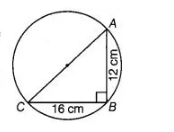If AB = 12 cm, BC = 16 cm and AB is perpendicular to BC, then the radius of the circle passing through the points A, B and C is
(a) 6 cm
(b) 8 cm
(c) 10 cm
(d) 12 cm
(c) Given, $A B=12 \mathrm{~cm}$ and $B C=16 \mathrm{~cm}$
In a circle, $B C \perp A B$, it means that $A C$ will be a diameter of circle.

[diameter of a circle subtends a right angle to the circle]
Use Pythagoras theorem in right angled $\triangle A B C$,
$A C^{2}=A B^{2}+B C^{2}$
$\Rightarrow$ $A C^{2}=(12)^{2}+(16)^{2}$
$\Rightarrow$ $A C^{2}=144+256 \Rightarrow A C^{2}=400$
$\Rightarrow$ $A C=\sqrt{400}=20 \mathrm{~cm}$
[taking positive square root, because diameter is always positive]
$\therefore \quad$ Radius of circle $=\frac{1}{2}(A C)=\frac{1}{2} \times 20=10 \mathrm{~cm}$
Hence, the radius of circle is $10 \mathrm{~cm}$.
Click here to get exam-ready with eSaral
For making your preparation journey smoother of JEE, NEET and Class 8 to 10, grab our app now.
